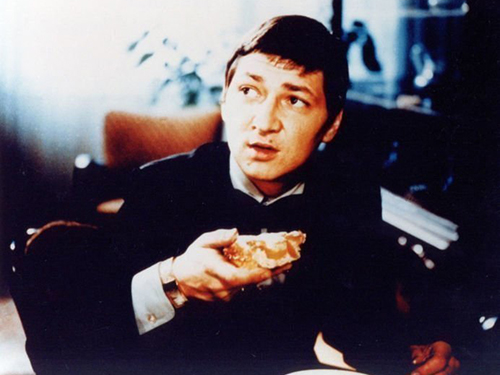
“Upon its release in Europe and the United States in 1975–76, Rainer Werner Fassbinder’s Fox and His Friends (Faustrecht der Freiheit, 1975) disappointed many European and American gay critics. In their reviews, these critics criticized the film from two dominant perspectives. First, the film was dismissed as not really about homosexuality, but about class divisions and how capitalism allows the bourgeoisie to exploit the proletariat. Second, the film was denounced for its portrait of a pathetically retro gay world, full of stereotypes and loveless gay relationships and bereft of gay politics.
But these criticisms, I would argue, failed to recognize the radical apparatus at work in Fassbinder’s film, which bridges gay, art, and mainstream cinema. While Fox ignored contemporary gay activism, the film developed an unprecedented gay apparatus within art cinema and challenged heteronormativity by normalizing homosexuality, while developing a critique of class divisions and economic exploitation within the gay world. Fox also presages the move away from the 1970s’ counter cinema practiced by feminist and other independent activist filmmakers who sought to develop avant‐garde narrative forms and a cinematic language that provided an alternative to or critiques of the language of dominant cinema, particularly Hollywood. Fassbinder situated himself between the popular and the avant‐garde. Compared to the ‘old‐style’ homosexual films such as Staircase (Stanley Donen, 1969) and Boys in the Band (William Friedkin, 1970) or to gay avant‐garde films, such as Rosa von Praunheim’s It is Not the Homosexual Who Is Perverse, But the Society in Which He Lives (1971), Fassbinder did something new in Fox. He drew upon the techniques of neorealism, new wave cinema, and on the conventions of Hollywood melodrama, particularly as influenced by the Hollywood director and German émigré Douglas Sirk, to radically de‐center heterosexuality as the unmarked norm within Hollywood narrative and genre. Unlike either the ‘old‐style’ or avant‐garde activist gay films, Fox does not make homosexuality the problem, but rather posits it as the exuberant and inescapable métier through which to analyze class.”
Ronald Gregg1
“When a film puts sex and class on a parallel track, as does Fox and His Friends, the story of a proletarian hero who is both sexually exploited and economically ruined by his bourgeois lover, while his lack of education, his peasant manners and naive adulation of middle-class values make him a laughing stock for the snobs he so much admires, the narrative can easily appear didactic, for it seems to lack the dimension of poetic justice or ironic reversal that gives the stages of the Fassbinder plot usually such a grimly satisfying shape. However, Fox and His Friends is the kind of film where the moral point of view is more complex and interesting than the formal pattern, which is why the film marks a certain end-point: the (politically correct) perspective from without sees only an abstract schematicism or a devastatingly total pessimism, which was felt to be ‘reactionary’ at a time and in a situation - 1974 - when homosexuals were fighting for a fairer and more positive representation in the media. Yet if one applies to Fox and His Friends and other films of Fassbinder’s middle period the ‘inner perspective’, a somewhat different view emerges. It is also worth remembering just how unique Fassbinder’s early films were: concerned with exploring the conflicting claims of sexual and class identity, they depict everyday human situations with a casual self-evidence unseen before in post-war German cinema (and even television). At first, subjectivity and social self are represented as parallel spheres, where sexual oppression and the patriarchal family reflect the wider social pressures of capitalism and bourgeois ideology. It is a congruence which preoccupied the German Left and the anti-authoritarian movement more than virtually any other topic. Yet, rather than trying to find a way to free themselves, by showing his protagonists coming to a raised consciousness, breaking out of the family in order to become militants, which was the demand of a certain ‘political film practice’, and of ‘progressive-realist’ film theory, Fassbinder appears to let his characters rot in their despair. However, the critics who argued that Fassbinder abandoned his heroes to their hopelessness, and accused him of defeatism were perhaps too readily adopting only the ‘view from outside’, from which the characters’ relentless misery does indeed appear as a victim’s stance, making every new torture and humiliation appear gratuitously sadistic.”
Thomas Elsaesser2
- 1Ronald Gregg, “Fassbinder’s Fox and His Friends and Gay Politics in the 1970s,” in: Brigitte Peucker (ed.), A Companion to Rainer Werner Fassbinder (Oxford: Blackwell Publishing, 2012), 564-565.
- 2Thomas Elsaesser, Fassbinder’s Germany. History, Identity, Subject (Amsterdam: Amsterdam University Press, 1996), 33-34.

